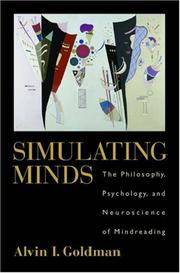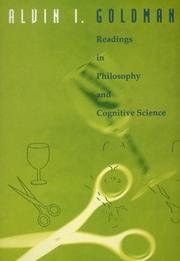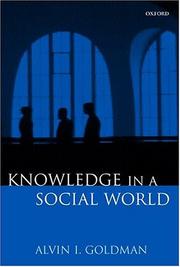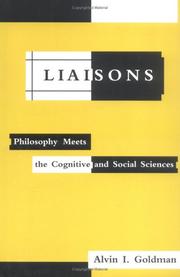| Listing 1 - 10 of 21 | << page >> |
Sort by
|
Book
ISBN: 9780195369830 0195369831 0199881421 1281158801 9786611158804 0198031769 1435618564 Year: 2008 Publisher: Oxford Oxford University Press
Abstract | Keywords | Export | Availability | Bookmark
 Loading...
Loading...Choose an application
- Reference Manager
- EndNote
- RefWorks (Direct export to RefWorks)
We have thoughts, feelings and emotions, and we grasp our own mental states, and conduct the business of ascribing them to ourselves and others without instruction in formal psychology. How do we do this? This book explores these questions.
Philosophical anthropology --- Theory of knowledge --- Affective and dynamic functions --- Social psychology --- Social perception. --- Empathy. --- Perception sociale --- Empathie

ISBN: 0674258959 0674258967 9780674258952 9780674258969 Year: 1986 Publisher: Cambridge (Mass.): Harvard university press
Abstract | Keywords | Export | Availability | Bookmark
 Loading...
Loading...Choose an application
- Reference Manager
- EndNote
- RefWorks (Direct export to RefWorks)
Cognition --- Knowledge, Theory of --- Cognition. --- Philosophy --- Epistemology --- Theory of knowledge --- Psychology --- Philosophical Overview --- Hedonism --- Stoicism --- Overview, Philosophical --- Overviews, Philosophical --- Philosophical Overviews --- Philosophies --- Cognitive Function --- Cognitions --- Cognitive Functions --- Function, Cognitive --- Functions, Cognitive --- Knowledge, Theory of. --- Philosophy. --- Cognitive psychology --- Pharmacy Philosophy --- Pharmacy Philosophies --- Philosophies, Pharmacy --- Philosophy, Pharmacy --- Connaissance (Théorie de la) --- Kennisleer.

ISBN: 0813380405 9780813380407 Year: 1993 Publisher: Boulder (Colo.) : Westview press,
Abstract | Keywords | Export | Availability | Bookmark
 Loading...
Loading...Choose an application
- Reference Manager
- EndNote
- RefWorks (Direct export to RefWorks)

ISBN: 0195138929 9780195138924 0199786488 0199881421 0195369831 9786611158804 0198031769 1281158801 1435618564 Year: 2006 Publisher: New York (N.Y.) Oxford university press
Abstract | Keywords | Export | Availability | Bookmark
 Loading...
Loading...Choose an application
- Reference Manager
- EndNote
- RefWorks (Direct export to RefWorks)
People are minded creatures; we have thoughts, feelings and emotions. More intriguingly, we grasp our own mental states, and conduct the business of ascribing them to ourselves and others without instruction in formal psychology. How do we do this? And what are the dimensions of our grasp of the mental realm? In this book, Alvin I. Goldman explores these questions with the tools of philosophy, developmental psychology, social psychology and cognitive neuroscience. He refines an approach called simulation theory, which starts from the familiar idea that we understand others by putting ourselves in their mental shoes. Can this intuitive idea be rendered precise in a philosophically respectable manner, without allowing simulation to collapse into theorizing? Given a suitable definition, do empirical results support the notion that minds literally create (or attempt to create) surrogates of other peoples mental states in the process of mindreading? Goldman amasses a surprising array of evidence from psychology and neuroscience that supports this hypothesis.
Empathy. --- Social perception. --- Empathy --- Social perception --- Cognition, Social --- Interpersonal perception --- Social cognition --- Interpersonal relations --- Perception --- Social cognitive theory --- Attitude (Psychology) --- Caring --- Emotions --- Social psychology --- Sympathy

ISBN: 0262571005 0262071533 0262287811 0585026572 9780262287814 9780262571005 Year: 1993 Publisher: Cambridge : MIT Press
Abstract | Keywords | Export | Availability | Bookmark
 Loading...
Loading...Choose an application
- Reference Manager
- EndNote
- RefWorks (Direct export to RefWorks)
Annotation

ISBN: 0198238207 9780198238201 0198237774 019159752X 1282051873 9786612051876 0191519286 Year: 1999 Publisher: Oxford Clarendon
Abstract | Keywords | Export | Availability | Bookmark
 Loading...
Loading...Choose an application
- Reference Manager
- EndNote
- RefWorks (Direct export to RefWorks)
Social epistemology. --- Theory of knowledge --- Epistémologie sociale --- Social epistemology --- Epistemology, Social --- Knowledge, Theory of --- Social role --- Knowledge, Sociology of --- Épistémologie --- Épistémologie des sciences sociales --- Épistémologie --- Épistémologie des sciences sociales

ISBN: 0262071355 9780262071352 0262514486 9780262514484 Year: 1992 Publisher: Cambridge, Mass. MIT
Abstract | Keywords | Export | Availability | Bookmark
 Loading...
Loading...Choose an application
- Reference Manager
- EndNote
- RefWorks (Direct export to RefWorks)
These essays by a major epistemologist reconfigure philosophical projects across a wide spectrum, from mind to metaphysics, from epistemology to social power. Several of Goldman's classic essays are included along with many newer writings. Together these trace and continue the development of the author's unique blend of naturalism and reliabilism.Part I defends the simulation approach to mentalistic ascription and explores the psychological mechanisms of ontological individuation. Part II shows why epistemology needs help from cognitive science - not only to evaluate cognitive agents but also to illuminate the practices of epistemic evaluators. Parts III and IV explain how philosophical projects can be reshaped through interchange with social science. An epistemological study of scientific activity exploits the economic paradigm, and philosophical tools are applied to analyze power in society.Alvin I. Goldman is Professor of Philosophy and Research Scientist in Cognitive Science at the University of Arizona. During 1991-92 he served as President of the American Philosophical Association, Pacific Division.Contents:Mind and Metaphysics. Interpretation Psychologized. Metaphysics, Mind, and Mental Science. Cognition and Modal Metaphysics. Individual Epistemology. A Causal Theory of Knowing. Discrimination and Perceptual Knowledge. What Is justified Belief? Strong and Weak justification. Psychology and Philosophical Analysis. Epistemic Folkways and Scientific Epistemology. Social Epistemology. Foundations of Social Epistemics. Epistemic Paternalism: Communication and Control in Law and Society. An Economic Model of Scientific Activity and Truth Acquisition (with Moshe Shaked). Social Power. Toward a Theory of Social Power. On the Measurement of Power.
Knowledge, Sociology of. --- Philosophy and cognitive science. --- Philosophy and social sciences. --- Connaissance [Sociologie de la ] --- Filosofie en cognitieve wetenschap --- Filosofie en sociale wetenschappen --- Kennis [Sociologie van de ] --- Knowledge [Sociology of ] --- Philosophie et science cognitive --- Philosophie et sciences sociales --- Sociologie van de kennis --- Philosophie et sciences cognitives --- Philosophy of science --- Knowledge, Theory of. --- Théorie de la connaissance --- Sociologie de la connaissance --- Philosophy and cognitive science --- Knowledge [Theory of ]
Book
ISBN: 0691616736 0691643970 0691019746 1400868971 9780691616735 9781400868971 9780691019741 9780691072166 Year: 2015 Publisher: Princeton, NJ
Abstract | Keywords | Export | Availability | Bookmark
 Loading...
Loading...Choose an application
- Reference Manager
- EndNote
- RefWorks (Direct export to RefWorks)
This book articulates an original scheme for the conceptualization of action. Beginning with a new approach to the individuation of acts, it delineates the relationships between basic and non-basic acts and uses these relationships in the definition of ability and intentional action. The author exhibits the central role of wants and beliefs in the causation of acts and in the analysis of the concept of action.Professor Goldman suggests answers to fundamental questions about acts, and develops a set of ideas and principles that can be used in the philosophy of mind, the philosophy of language, ethics, and other fields, including the behavioral sciences.Originally published in 1977.The Princeton Legacy Library uses the latest print-on-demand technology to again make available previously out-of-print books from the distinguished backlist of Princeton University Press. These editions preserve the original texts of these important books while presenting them in durable paperback and hardcover editions. The goal of the Princeton Legacy Library is to vastly increase access to the rich scholarly heritage found in the thousands of books published by Princeton University Press since its founding in 1905.
Psychology. --- Behavioral sciences --- Mental philosophy --- Mind --- Science, Mental --- Human biology --- Philosophy --- Soul --- Mental health --- Behaviorism (Psychology) --- Act (Philosophy) --- Béhaviorisme (Psychologie) --- Action (Philosophie) --- Psychologie
Book
ISBN: 0190267674 0199891605 0199874182 9780199891603 9780190267674 9780199874187 Year: 2013 Publisher: Oxford Oxford University Press
Abstract | Keywords | Export | Availability | Bookmark
 Loading...
Loading...Choose an application
- Reference Manager
- EndNote
- RefWorks (Direct export to RefWorks)
What distinguishes humankind from other species? A leading candidate is our facility at mutual understanding (""theory of mind""), our ability to ascribe thoughts, desires, and feelings to one another. How do we do this? Folk-wisdom says, ""By empathy -- we put ourselves in other people's shoes"". In the last few decades this idea has moved from folk-wisdom to philosophical conjecture to serious scientific theory. This volume collects essays by Alvin Goldman, many of which have played a major role in crystallizing this ""simulation,"" or ""empathizing,"" account of mindreading and showing how
Philosophy of mind. --- Cognitive neuroscience. --- Cognitive neuropsychology --- Mind, Philosophy of --- Mind, Theory of --- Theory of mind --- Cognitive science --- Neuropsychology --- Philosophy --- Metaphysics --- Philosophical anthropology --- Cognitive psychology --- Theory of knowledge

ISBN: 9780195173673 9780195138795 0195173678 0195138791 1281943541 9786611943547 0198031734 0199833257 Year: 2004 Publisher: New York (N.Y.) Oxford university press
Abstract | Keywords | Export | Availability | Bookmark
 Loading...
Loading...Choose an application
- Reference Manager
- EndNote
- RefWorks (Direct export to RefWorks)
In this title Alvin Goldman approaches many epistemological issues as questions about legitimate methods or pathways to knowledge.
| Listing 1 - 10 of 21 | << page >> |
Sort by
|

 Search
Search Feedback
Feedback About UniCat
About UniCat  Help
Help News
News